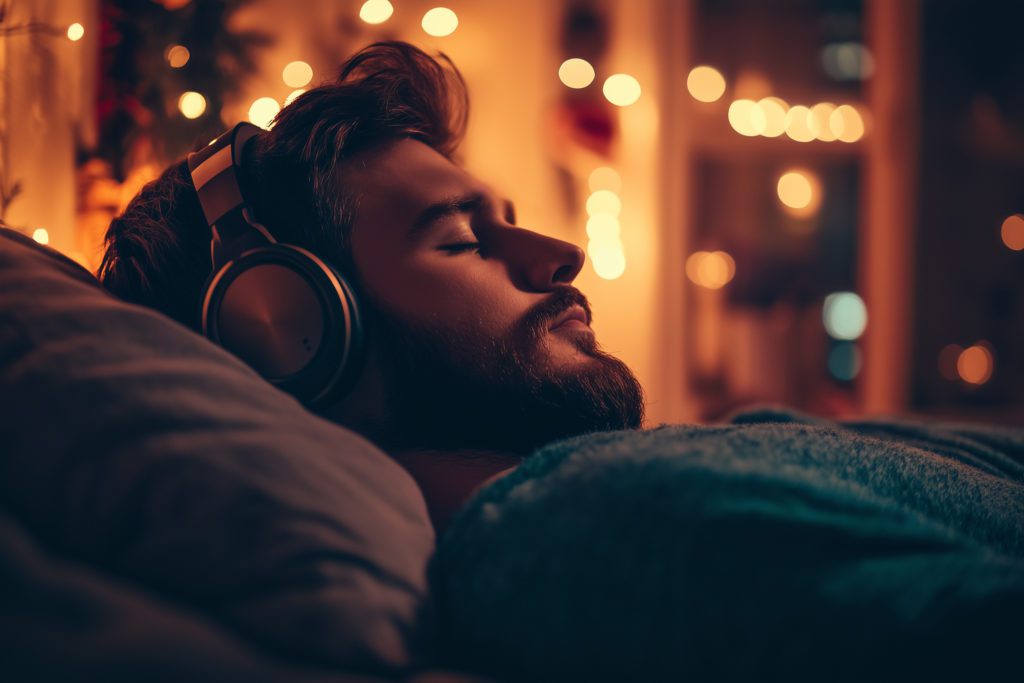
Music, Sleep, and Stress Reduction
Music offers many healing properties, including its ability to reduce stress and promote relaxation. When used at night, music can help you fall asleep.

When you’re stressed as you lay in bed at night, you know that you’re likely to have a long night ahead of you. Not only can stress make it harder to fall asleep, but it can make you more likely to wake in the middle of the night, disrupting your sleep and creating a challenge to fall back asleep.
Knowing the negative impact that stress can have on your sleep, having methods to reduce your stress levels can be vital for preserving your sleep quality. While there are many options that you can have on hand, having a stress-reducing tool that requires you to do nothing but listen can be especially easy to implement, creating a big impact with minimal effort.
How Stress Affects Your Sleep
If you think that you can say goodnight to stress the second you crawl into bed at night, think again. In fact, stress may have a greater connection to your sleep than you may think.
Our body responds to the stress hormone cortisol through the HPA axis, a network in the brain that takes input from the body and releases hormones in response. However, sleep also influences this axis, making the HPA axis a site of connection between stress and sleep.
Research has shown that when the HPA axis is overactive, such as when you are stressed, it can disrupt your sleep cycles, causing insomnia, inhibited sleep, and more nighttime awakenings. Even more, these sleep disturbances can increase your cortisol production, with studies showing that insomnia is linked to higher production of cortisol during the day. Thus, being stressed worsens your sleep, which then causes your body to produce more cortisol, creating an endless cycle of poor sleep and high stress.
In addition to this influence of high cortisol levels, being stressed can also take you out of the right headspace for sleep. Think of it this way: if you’re stressed, the source of your stress likely takes up many of your thoughts—when you go to bed at night and lie still, you have nothing to do but think of these stressful thoughts, which can then make it difficult to fall asleep.
However, when you’re feeling stressed, you may be able to use music to calm down.
How Music Reduces Stress Levels
Music has been shown to produce physiological changes that correlate to lower stress and anxiety levels, including lowering your blood pressure and heart rate. It has also been shown to affect the autonomic nervous system, leading to a faster recovery from stress.
A 2020 overview of research regarding music and stress suggests that music can:
- Release endorphins and improve our sense of well-being
- Deactivate the amygdala, reducing the intensity of stress-related emotional states
- Lower our cortisol levels and heart rate
- Reduce stress-related symptoms
- Serve as a distractor, reducing emotional and physical stress levels
Music offers additional benefits for our stress. For example, music therapy has shown significant benefits in preventing burn-out in operating room staff, with a 6-week study showing that having music-listening sessions each day decreases stress levels and emotional exhaustion.
Music can also improve mental health, with an overview of its uses in mental health treatment showing that 68.5% of music-based interventions had positive results. Other studies have shown that it reduces depression levels and anxiety.
The benefits of music in calming the mind and body are some of the most common reasons why people listen to music before bed. One study on 651 individuals found that 65% listened to music to help them sleep, with the most common responses regarding why they listened to music being:
- Music induces a mental or physical state conducive to sleep
- Music offers properties that help stimulate sleep
- Music provides a distraction from internal or external stimuli that would otherwise disrupt sleep
- Music has become a part of their normal sleep routine
Music vs. Music Therapy
Music therapy differs from just turning on one of your favorite songs, even though listening to music remains a big part of it.
With music therapy, music therapists plan individualized sessions to help you meet your goals. These sessions may consist of music listening, composing, playing, or songwriting, so it might not just be listening to music. The goal of these “purposeful” interactions with music is to provide an outlet to work through emotions and issues that are bothering you, such as what might be causing you stress.
A 2015 study comparing listening to music to music therapy found that, while 77% of patients preferred music therapy sessions compared to listening to music on their own, all forms of music listening showed positive results. So, you don’t need to undergo music therapy in order to see its benefits for your stress and sleep.
Using Music to Destress and Sleep Better
If you’re interested in the power of music in reducing stress and improving your sleep, try out these tips:
- Find the music you like. While classical and other lyric-less music is often associated with reducing stress levels, the truth is that any type of music can help to reduce your stress levels so long as it is something you enjoy. So, don’t force yourself to listen to one kind of music just because you think you should; listen to what you enjoy.
- Create a routine. Many people make music-listening a part of their nighttime routine, which then offers another prompt for your mind regarding your impending bedtime. Additionally, this promises a bit of relaxation each night, and a mood boost thanks to a song (or songs) that you enjoy.
- Combine music with meditation. If you’re interested in boosting your stress reduction, try combining music with meditation. Some meditation prompts even utilize music, already combining the two.
Play the Stress Away
Music is powerful in its ability to not only entertain but also to heal, and these properties extend to its ability to reduce stress levels and aid sleeping endeavors. Music not only lowers stress and anxiety, but it can improve your mood, relax your body, and become a part of your nighttime routine.
When you’re feeling stressed, turn on one of your favorite songs and see the catharsis that can come from your favorite tune.
FAQ
What type of music is best for sleep and relaxation?
While classical and ambient music are often recommended for relaxation, the best choice is personal. Slow-tempo, instrumental, and nature-infused sounds are commonly effective, but any music that you personally find calming can aid relaxation and sleep.
Can listening to music while sleeping disrupt sleep quality?
For most people, music can enhance sleep by reducing stress and creating a soothing environment. However, if music is too loud, contains jarring transitions, or keeps you too engaged, it might hinder deep sleep. Using a sleep timer or instrumental tracks can help prevent disruptions.
Does the tempo of a song affect how well it helps with sleep?
Yes, studies indicate that music with a tempo of about 60 beats per minute aligns with the natural resting heart rate and can encourage relaxation. Slower tempos tend to be more effective for sleep than fast-paced or highly dynamic music.
Is it better to use headphones, speakers, or sleep earbuds when listening to music at night?
Speakers or sleep-friendly earbuds are ideal for comfort and safety. Regular headphones or earbuds may cause discomfort or ear strain if worn all night. Using a sleep timer to turn music off after a certain period can help prevent any potential risks.
How long should I listen to music before bed for the best results?
Listening for at least 30 to 45 minutes before sleep can be beneficial. The key is creating a relaxing pre-sleep routine where music signals your body to unwind and prepare for rest.

Written by
Jessica G
Medical writer freelancer who has written hundreds of articles on varying topics. Masters of Engineering degree in Biomedical Engineering.
Download Pillow
Get help
Press & News
Legal
Connect
X (Twitter)
Company
Copyright © Neybox Digital Ltd.



